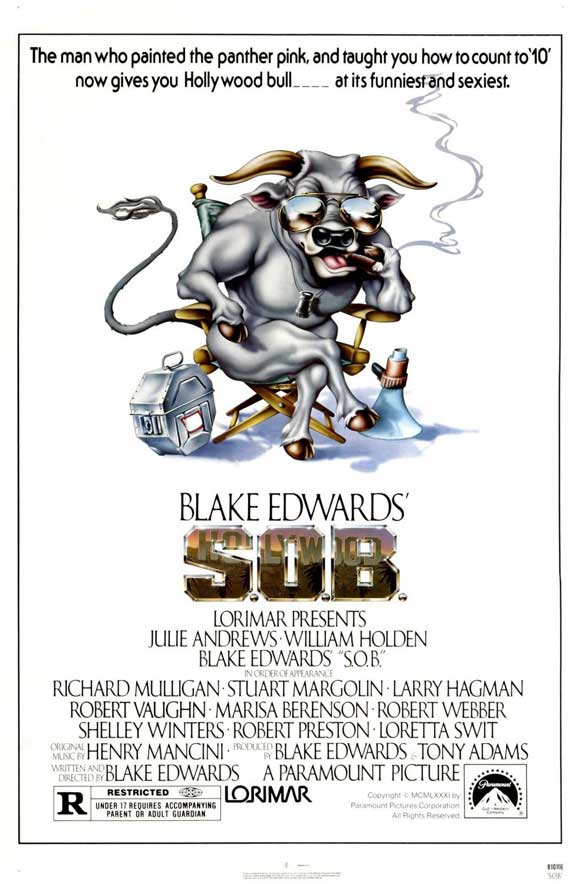
Blake Edwards was mad at Hollywood. He’d gone through some things, man, and now he had a whole lot of beef with the entire cynical, money-grubbing, back-stabbing lot. In 1981, after making a comeback with mega-hits The Pink Panther and 10, he started on a nasty little poison pen letter to Tinseltown called S.O.B., short for “standard operational bullshit,” otherwise known as the way Hollywood always works. S.O.B. is a tale of Felix Farmer (Richard Mulligan), the biggest, most profitable producer in the industry, and his suicidal despair at the terrible reviews his sickly sweet family film Night Wind, starring his beloved wife Sally Miles (Julie Andrews), has gotten in previews.
Still alive despite his best attempts, an impromptu orgy in his living room gives him a eureka moment that resurrects his will to live: he’ll turn Night Wind into soft porn, have his demure ex-wife go nude, and rake in the profits. As this plan gains steam, there’s a lot of yelling, panic, suicide, attempted murder and broken bones, random topless women, racist jokes, angry executives, and even some dick-punching. It’s just another week in L.A.
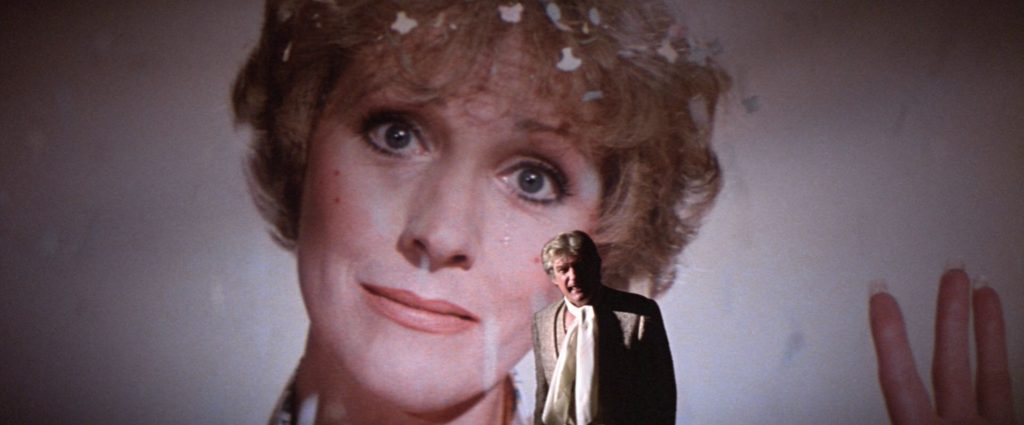
S.O.B. (1981) is based on Edwards’s experience earlier in his career, about a decade before his biggest successes, but there’s also a scene based on the old chestnut about Barrymore’s corpse going walkabout with his drunken pals, and a finale that gives a big warm nod to The Loved One, an equally nasty but superior satire of Hollywood, mostly because it deals with a Hollywood-adjacent industry rather than taking Hollywood head on.
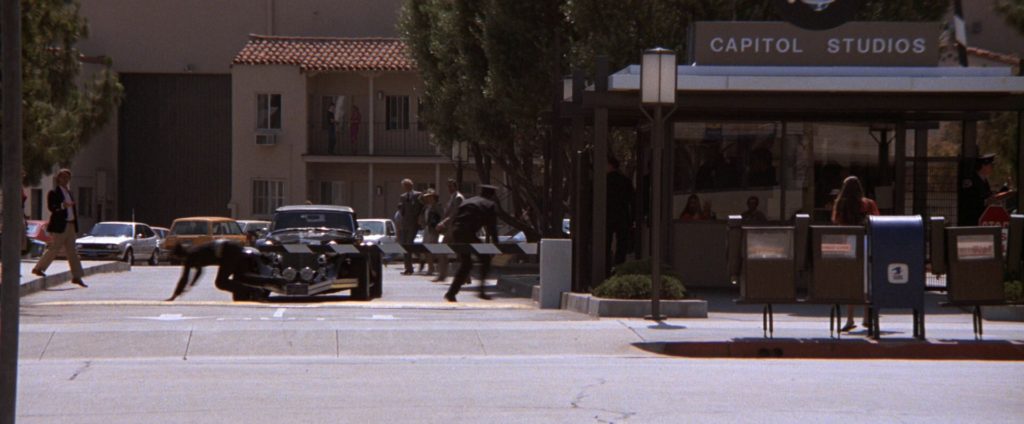 This all takes place at the fictional Capitol Studios. The studio in Hail, Caesar! was the similarly named Capitol Pictures.
This all takes place at the fictional Capitol Studios. The studio in Hail, Caesar! was the similarly named Capitol Pictures.
It probably helped that The Loved One, when it referenced real people, did so quietly. S.O.B. makes absolutely no bones about who it’s sending up. Robert Vaughn is studio owner David Blackman, a character based heavily on Robert Evans, though as Time noted when the film was released, there’s some of MGM’s James Aubrey in there, too. Blackman is married to the beautiful Mavis (Marisa Berenson), an Ali McGraw surrogate, and who is carrying on an affair with hunky Sam Marshall (David Young), a.k.a. Steve McQueen, same initials and everything.
The film that Mavis pushes to get Sam the lead role is probably a reference to The Great Gatsby, which Bob Evans had bought the rights to in the early 1970s. In The Kid Stays in the Picture, Evans talks at length about how he thought McQueen would be a… great Gatsby. (Sorry. Maybe.) That is, he thought Steve would be perfect for the role until he got Truman Capote’s treatment of Gatsby, at which point he told his wife Ali, and I quote, “Fuck Gatsby. Make The Getaway with McQueen. Together you’ll make it the hottest movie of the year.” That did not turn out well, either on the relationship front or on the cinematic adaptation of Jim Thompson novels front, though I understand I may be in the minority of opinion on the latter.
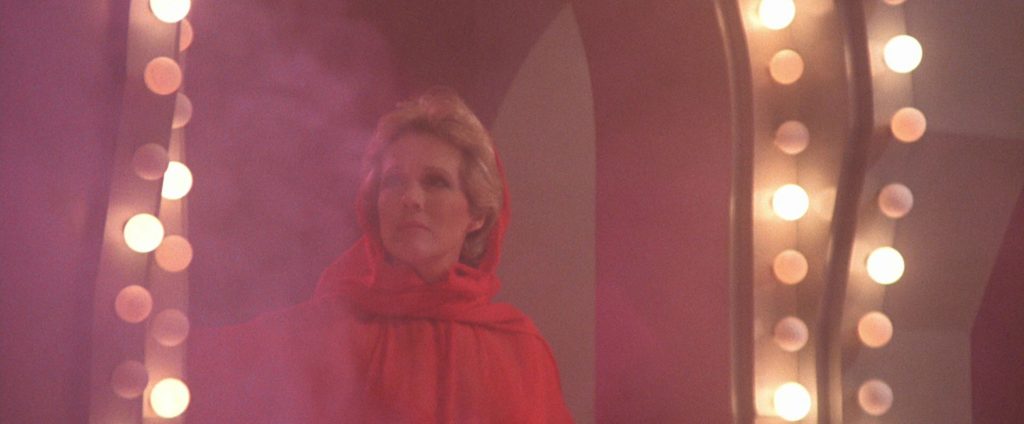
Also appearing in barely disguised caricature is Loretta Swit as the vile and hated Joyce Haber, though she’s wearing dippy kind of high-necked thing that’s really more Rona Barrett’s style, but Rona can’t have been more than a tiny bit of inspiration here. Shelly Winters, one of the best members of this ensemble cast, is a sort of Sue Mengers type, very shrewd, very classy, extremely manipulative. Mengers was reportedly livid at the portrayal.
Mengers and others may have been upset, but their treatment is tame compared to the vicious subplot involving the corpse of Burgess Webster, an old character actor who died suddenly on the beach outside Felix’s home, and no one, save his loyal dog, has noticed. The film periodically cuts back to his body and his sad dog, played by “Troubles,” who is about as heartbreaking as a doggie can be.
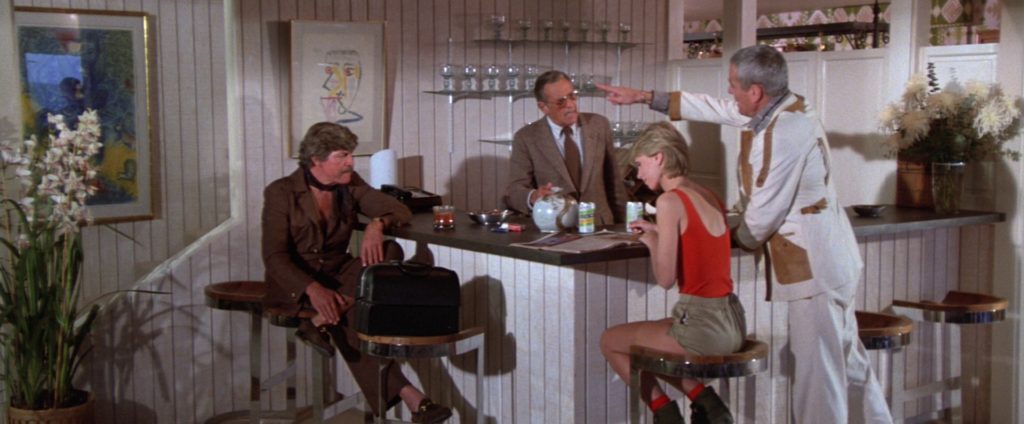 S.O.B. is dated, of course, especially with regard to the sexuality of several characters, with the exception of Irving. The good doctor spends all his time needling Ben (Robert Webber, seen above, pointing accusingly), and it provides some of the best moments. When Ben gets upset at Irving calling him nervous, he replies, “Don’t get sore; some of my best friends are nervous.” Preston is by far the best part of the movie, and even if the premise sounds terrible to you, I highly recommend it if for no reason than to see Preston try out his bitchy gay character a year before Victor/Victoria.
S.O.B. is dated, of course, especially with regard to the sexuality of several characters, with the exception of Irving. The good doctor spends all his time needling Ben (Robert Webber, seen above, pointing accusingly), and it provides some of the best moments. When Ben gets upset at Irving calling him nervous, he replies, “Don’t get sore; some of my best friends are nervous.” Preston is by far the best part of the movie, and even if the premise sounds terrible to you, I highly recommend it if for no reason than to see Preston try out his bitchy gay character a year before Victor/Victoria.
The dead Webster is played by Blake Edwards standby Herb Tanney, who frequently took a pseudonym based on his characters (Stiffe Tanney here, Sherloque Tanney in Victor/Victoria, etc.) He’s fine for the little he does, but it might have been nice to use some actual older character actors in this film to more firmly root it in Hollywood. Not necessarily roman à clef appearances as in Sunset Blvd., but older actors a la Singin’ in the Rain, used as a way to subtly break the fourth wall. Though, to be fair, SitR didn’t call attention to actors like Mae Clarke and Snub Pollard and Jack Hendricks, and wasn’t exactly kind to the late-silent and early-talkie eras, despite pretending to be; maybe SitR is a better example of the hypocrisy S.O.B. rails against than it is a fellow traveler along Sour Grapes Highway.
Then again, is really sour grapes when you have a legitimate complaint? In S.O.B., Felix buys the rights to Night Wind after the studio pulls a few fast ones. Something very similar happened not only in S.O.B. but with S.O.B.:
Amid charges of ”excessive expenditures” and countercharges of ”lame excuses,” Paramount, distributor of ”S.O.B.,” has canceled a $225,000 press junket for the film, which will open in 640 theaters next Wednesday. Mr. Edwards, writer, director and producer of ”S.O.B.,” which stars his wife, Julie Andrews, and William Holden, is putting on and paying for the junket.
You’d think that Edwards would have known he would ruffle some Tinseltown feathers, but when he made S.O.B., largely based on his miserable experience filming Darling Lili for Paramount, he had no intention of working with Paramount in the first place. But at the last minute, Lorimar severed ties with its distribution company and partnered with Paramount, who then began to make a huge fuss about the film, proving Edwards right, though studio execs (and often the public) never see it that way. We’re a country full of people who claim to love individuality and rebels and non-conformity, but the second someone seems like they’re “causing trouble,” everyone abandons them for fear of suffering some kind of consequence.
Which, obviously, is a main theme in S.O.B.
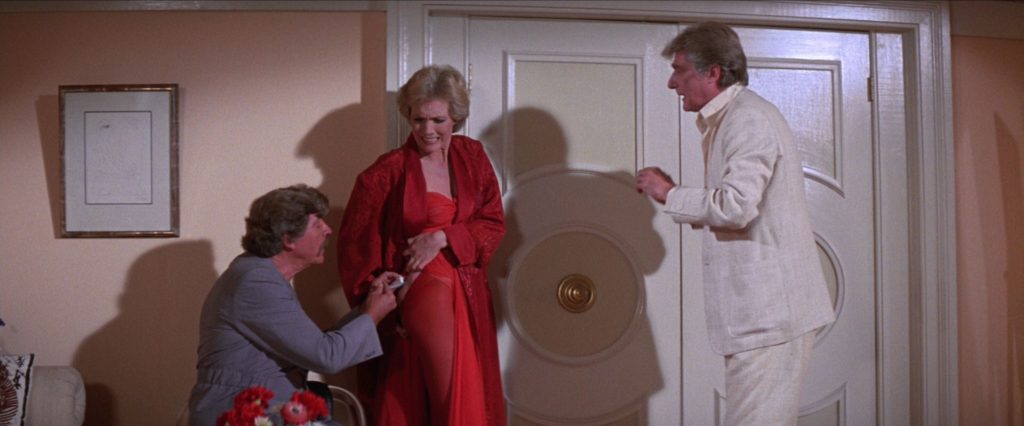
S.O.B. was the first film I remember ever really wanting to see. I was a cynical 8-year-old, apparently. When I wasn’t allowed to because, y’know, dick-punching, I lobbied to see Victor/Victoria the next year, which I think seemed like a more offensive film to my parents than S.O.B. Welcome to early-80s Middle America, kids, where gender identity scares the shit outta people but dick-punching is just good clean fun.
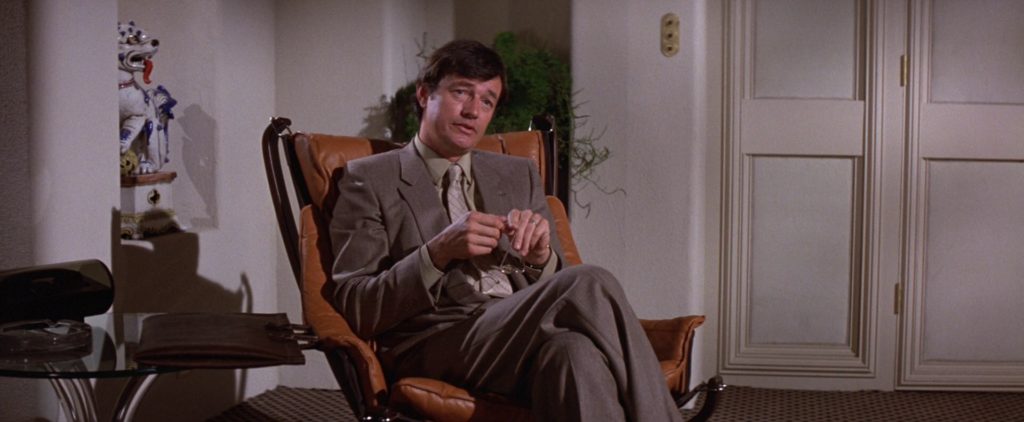 I don’t know why we don’t talk more about John Lawlor. He’s in everything and he’s terrific. Did you know he was the locksmith that Skyler convinced to let her into Walt’s apartment in “Breaking Bad”? Yeah, well, now you do.
I don’t know why we don’t talk more about John Lawlor. He’s in everything and he’s terrific. Did you know he was the locksmith that Skyler convinced to let her into Walt’s apartment in “Breaking Bad”? Yeah, well, now you do.
How did critics feel about S.O.B.? Not so hot. I’ve always suspected it’s because critics are almost entirely ignored in the film; if mentioned, they’re laughed off as inconsequential. Which is true, honestly, but critics disagreed, and there was often a strain of pettiness in reviews. New York Magazine noted in a disappointed tone that Andrews only bares her breasts, and that Edwards “overvalues the shock value of his wife’s flesh.” Bitch, bitch, bitch.
Admittedly, the film fails to really hit home the fact that the news was falsely reporting that Sally Miles had decided to film an “X-rated” sex scene. Instead, these background news reports sound legitimate, rather than the hype they really are. Felix never intended an X-rated scene, and Sally herself says repeatedly when she’s high on some Dr. Feelgood injection that she’s going to show her “boobies,” so it’s not as though either Night Wind or S.O.B. promised hot sizzling horizontal action and didn’t deliver. It promised breasts. It gave breasts. The industry as portrayed in the movie promised porn. The industry gave breasts. That’s the point, though one that’s lost on many.
Felix, when he’s not jumping around and screaming spittle everywhere, cheerfully explains that if Night Wind succeeds, then he won’t be crazy anymore. He doesn’t mean that it will cure his legitimate mental illness, but that Hollywood will see the profits and retroactively consider all his behavior to be completely sane, probably even his attempts at suicide. His ending is sad but noble, to a degree. Everyone else descends into repulsive absurdity. S.O.B. is a nasty and bitter little take on a nasty and bitter little industry.

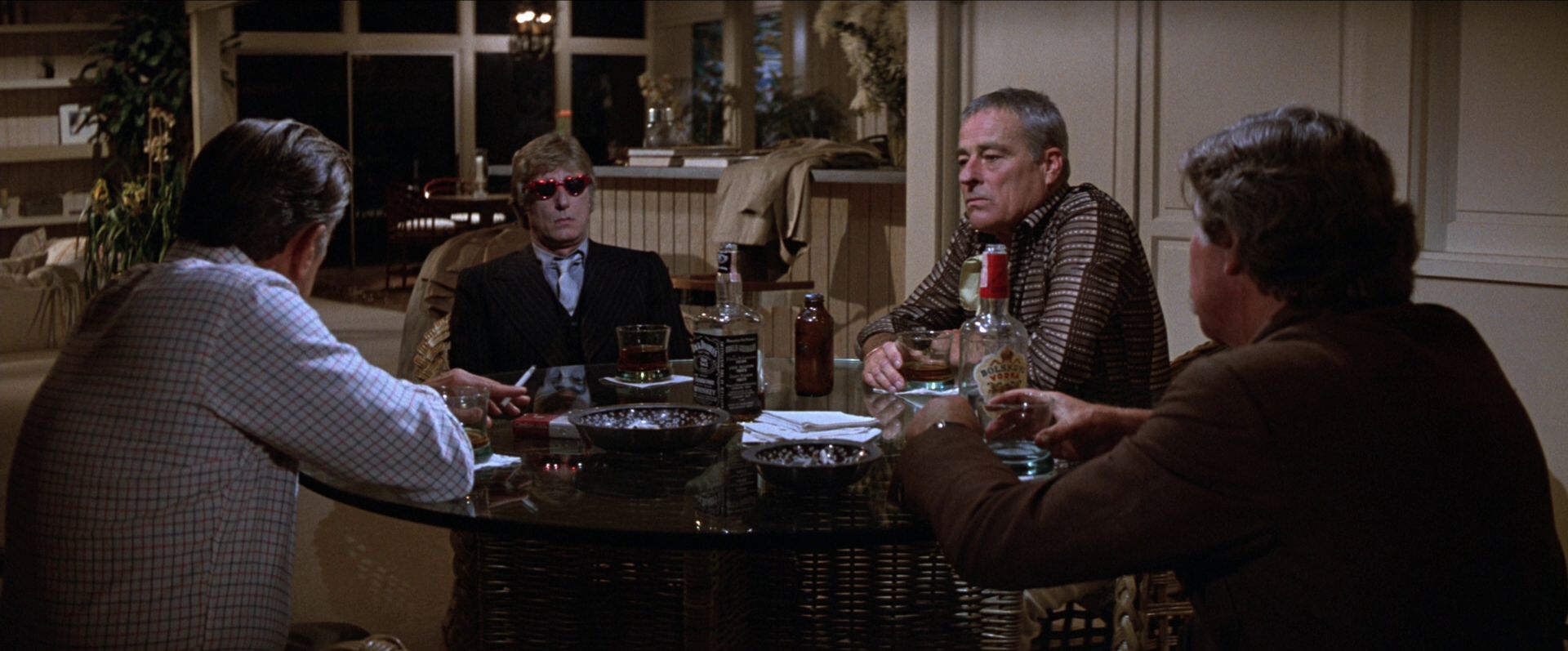
S.O.B has one of my all-time favorite dialog exchanges:
Dr. Robert Preston decides he needs a B-12 injection, but doesn’t want to give it to himself.
One of the hippie chicks offers to do the job for him.
Doctor: Are you a nurse?
Chick: No, but I used to be a junkie.
The hippie chick was Jennifer Edwards (erstwhile Heidi), making one of her many weirdo cameos in Dear Old Dad’s pictures.
Family loyalty, it’s wonderful …